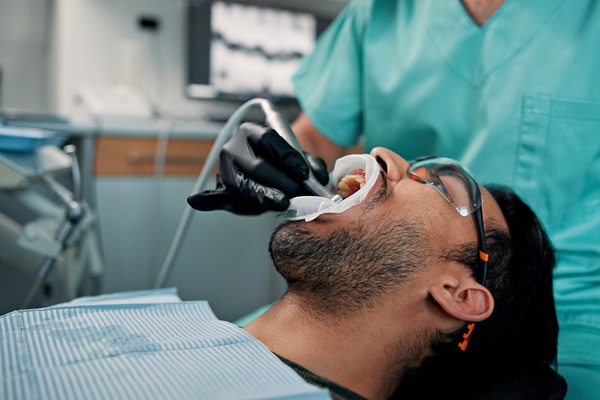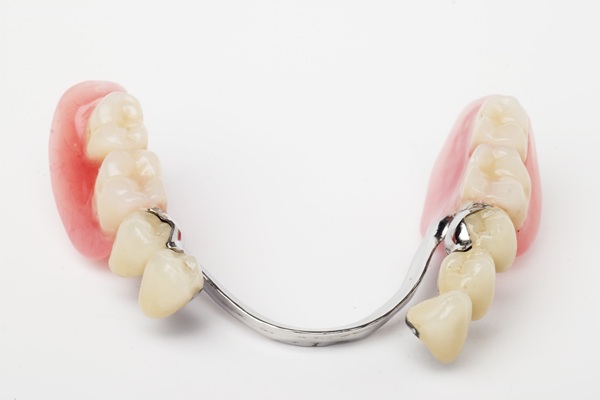Can Laser Dentistry Treat Periodontal Disease?

Laser dentistry continues to become more common in dental offices across the country. This form of care can help maintain strong, healthy teeth and gums. To battle gingivitis and periodontal disease, you do not have to endure traditional invasive procedures. By using a laser, your dentist can remove the bacteria and buildup causing you pain and irritation.
An explanation of gum disease
Periodontal disease occurs when bacteria damage the soft tissue of the gums. Without effective treatment, this condition can lead to bone loss. Eventually, the person’s teeth could become loose and fall out. Poor oral health habits contribute to gum disease. A lack of brushing and flossing causes plaque and tartar to build up on teeth and on the gumline. This can create pockets of bacteria and pus, inflaming the gums and causing them to bleed.
When to see the dentist
It is important to discuss laser dentistry options with the dentist when a patient’s gums bleed frequently. This may often happen while brushing teeth or eating. Swollen and painful gums are a good indication that the person has periodontal disease. The individual may also have bad breath or loose teeth. If these conditions exist, the patient should call the dentist right away to explore treatment possibilities.
How laser dentistry can help with gum disease
The chief approach to treating periodontal disease is to clean the teeth and gums. The dentist will remove the plaque, tartar and infection to help the gums heal. With lasers, the dentist can access the pockets of infection, killing it. Next, the dentist removes the plaque and tartar with a laser instead of with hand tools. The dentist can select the appropriate wavelength of the laser for the patient. This method also fosters new growth of tissue and bone in the affected area.
Limited bleeding
One of the consequences of gum disease is consistent bleeding of the soft tissue. Traditional treatments such as scaling and root planing require the dentist to scrape buildup from the teeth and roots. This can be painful and irritate the gums. With laser dentistry, the patient should experience less bleeding. It can also limit the amount of swelling in the gums.
Less invasive than other treatments
There was a time when the only way to repair periodontal disease was through invasive means. Laser dentistry does away with drilling and chiseling away buildup. By using a laser, the dentist will not even need to use a local anesthetic on the patient. Healing time can also be faster. Patients should not feel as much pain during this procedure as with other gum disease treatments.
Try a different approach
If you are looking for relief from gum disease, consider using laser dentistry to help. Talk to a dentist near you today about laser treatments to remove bacteria and buildup from your teeth and gums. This decision can spare you from having bone or tooth loss. Do something to preserve your oral health today. Make an appointment to start your treatment today.
Request an appointment here: https://lincroftvillagedental.com or call Lincroft Village Dental Care at (732) 842-5005 for an appointment in our Lincroft office.
Check out what others are saying about our services on Yelp: Read our Yelp reviews.
Recent Posts
Deep dental cleaning is a way to treat severe cases of gum disease. However, it is not always necessary for all cases of gum disease. By understanding when and why a dentist recommends a deep dental cleaning, you can feel more comfortable throughout the consultation and treatment process. Every dentist utilizes deep dental cleaning differently and…
There are many benefits to removable partial dentures instead of alternative treatment solutions (i.e., implant-supported bridges). Understanding the advantages of partial dentures can help you make the most informed choice possible about the best way to replace your missing teeth.Removable partial dentures are a form of teeth replacement for a section of missing teeth. They…
Full mouth reconstruction involves replacing and repairing damaged or missing teeth. A treatment plan includes a variety of different treatments, and one common procedure is known as dental bridge treatment. This review takes a closer look at how general dentists use dental bridges to replace teeth during full mouth reconstruction. Most patients have several available treatment…
Experiencing a need for a denture repair? Unfortunately, dentures are extremely prone to accidents, which can result in damages such as cracks or chips. When this happens, a lot of wearers wonder what they should do next. The answer is simple, visit a dentist's office.Denture repair should always be done by a dentist, but why?…


